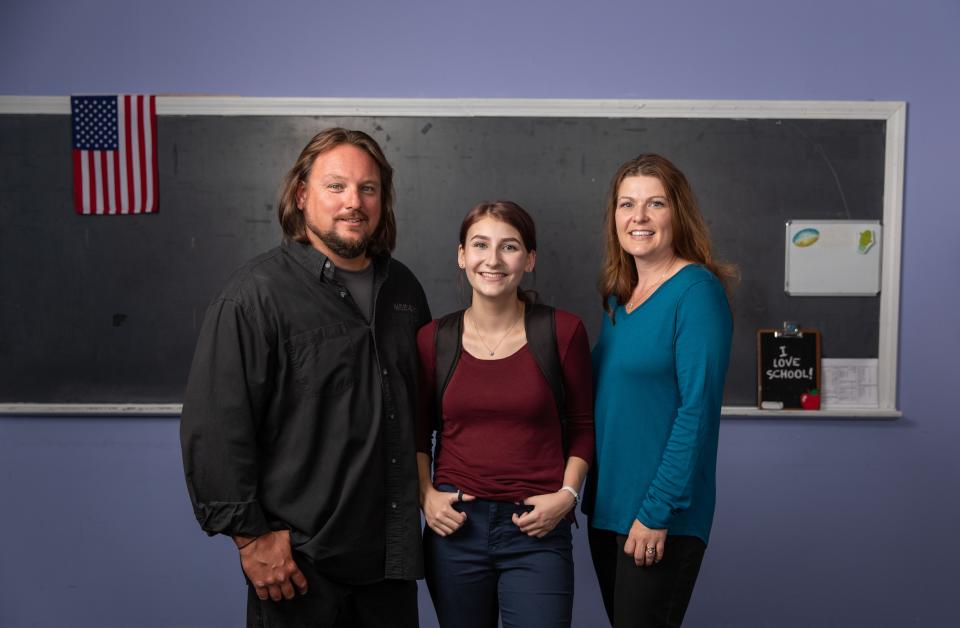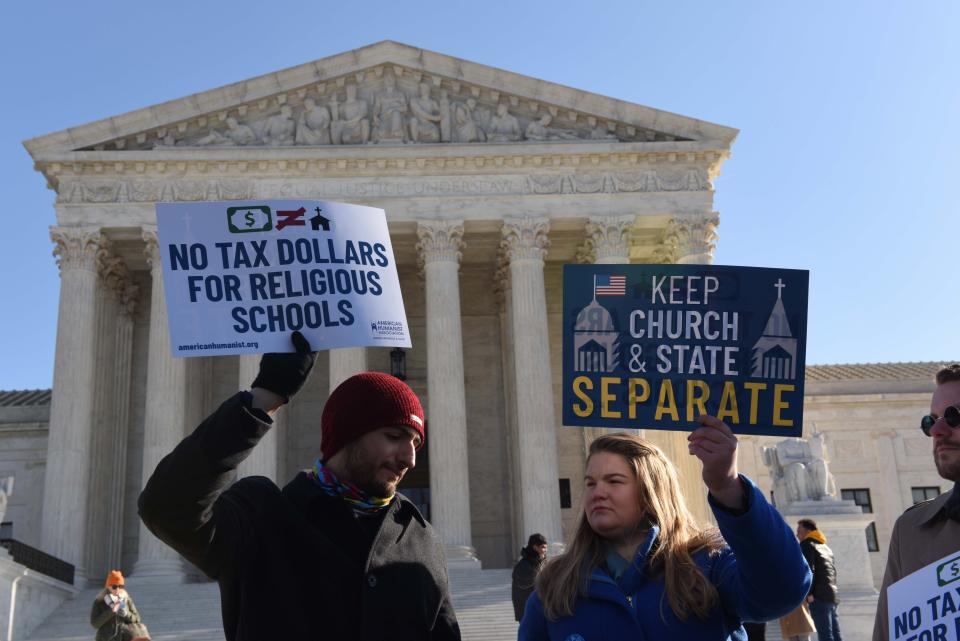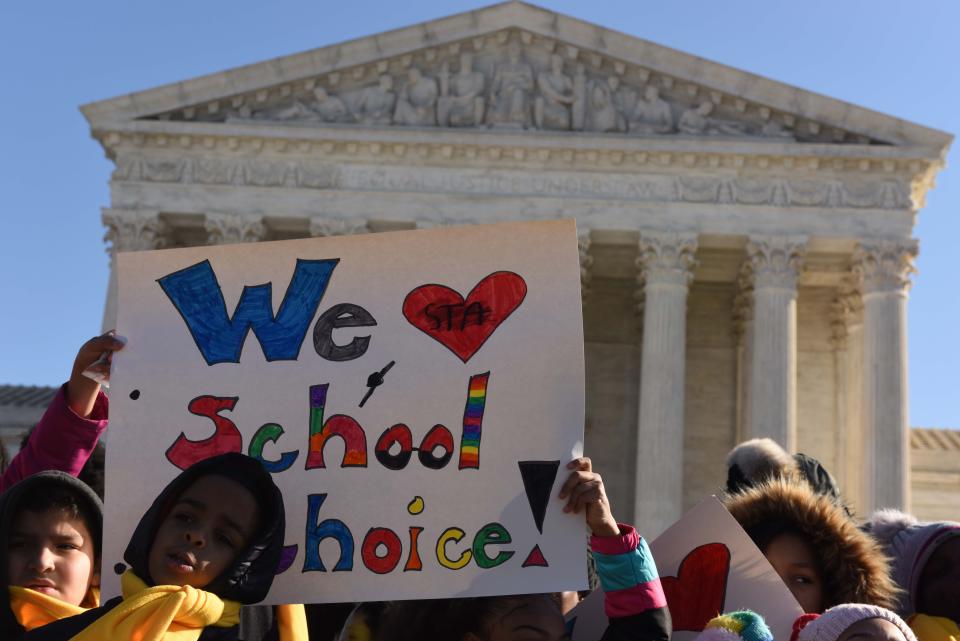Supreme Court to decide if religious schools may receive taxpayer funding for tuition
WASHINGTON – When the time came for their daughter to start high school, Amy Carson and her husband didn’t need to debate for long where she would go: The obvious choice was the same Christian school they both attended years ago.
But the decision had a big financial drawback. While Carson's home state of Maine provides subsidies for private school when a local district doesn't have its own secondary school, the state doesn't extend the assistance for religious instruction.
So when it came to the money, Carson and her husband were on their own.
Carson and another family are now challenging that policy at the Supreme Court – arriving for consideration at a time when the six-member conservative majority is looking favorably on claims brought under the First Amendment’s right to practice religion free from government interference.
"I don't think, just because you have the word 'Christian' or 'Catholic' in a school’s name that it should preclude your child from receiving the tax funds you're paying," Carson said. "People automatically go to, ‘I don't want my tax dollars going to religious things.' I don't want my tax dollars going to a lot of things they go to. Where do you draw the line?"
Poll: Democrats, Republicans equally unhappy with the Supreme Court
Abortion: Mississippi asks Supreme Court to overturn Roe v. Wade in blockbuster case
Breyer to retire?: Supreme Court Justice Breyer hasn't decided about retirement
The appeal, which the court agreed to hear last month, pits two constitutional principles against one another: The prohibition on government passing laws that prohibit the free exercise of religion and the ban on laws "respecting an establishment" of religion.
Maine officials argue sending taxpayer money to religious schools violates the second principle, or the so-called wall of separation between church and state.
"The state has good reasons for not funding religious schools: They're concerned about favoring particular religions and putting the state's imprimatur on religious schools’ teachings,” said Zachary Heiden, chief counsel at the American Civil Liberties Union of Maine, which supported the state as the case was in the lower federal courts.

Parents know best?
A ruling against Maine could raise other questions and more litigation about how religious schools that accept taxpayer money would navigate anti-discrimination laws. What would happen, for instance, if an openly gay teacher applied to work at one? What if a Muslim student was denied admission to a Christian school because of her religion?
Maine Attorney General Aaron Frey, a Democrat, said the likely answer to those questions is why the state barred the schools from receiving public money.
"Religious schools can and do advance their own religion to the exclusion of all others, discriminate in both the teachers they employ and the students they admit, and teach religious views inimical to what is taught in public schools," he said. "Parents are free to send their children to such schools if they choose, but not with public dollars."
Roberts rules: How Chief Justice John Roberts is exerting influence
Analysis: Steady term at the Supreme Court ends with politically fraught cases
LGBTQ: Supreme Court declines to hear transgender bathroom case
The Supreme Court ruled last year that religious schools are exempt from most employment discrimination claims, but that case didn't address whether public funding would change the calculation.
Maine's program is unusual, the result of a rural state where it often doesn't make sense to build a high school in a community with a small number of students. Vermont is the only other state with the system, though many other states are eyeing the case.
That's because the outcome, expected next year, could have implications beyond New England if the Supreme Court gives parents more power to redirect public funding to private schools. Several groups that support vouchers – a system that lets parents use public money to pay for private schools – have filed briefs supporting the parents in the case.
Critics of Maine’s policy say another principle is at stake: Parents' right to choose what's best for their children. Because Maine's program is based on an individual's choice, they say, the state shouldn’t be able to foreclose religious schools by denying tuition funding while giving it to secular education.
Some parents might choose a school that focuses on science, said Michael Bindas, a senior attorney with the libertarian Institute for Justice, which is representing the parents. For others, they may want a school to emphasize foreign languages or the arts.
"For others, it's going to be schools that provide religious instruction, and a parent should be just as entitled to pick that type of school as they are to pick any of those other types," Bindas said. "And that's all this case is about: Can government single out and exclude schools simply because they teach religion?"
Part of the reason Carson chose Bangor Christian School for her daughter, Olivia, was the connection it had to her family. Not only did Carson and her husband attend, but her mother-in-law taught there. Her husband’s father went to church there.
"It's really an extended family," Carson said of the school.

Started on the playground
The Supreme Court has been inching closer to the parents' position in a series of recent decisions – underscoring its favorable view of claims challenging laws and regulations that burden religious exercise. Those challenges have been successful in striking COVID-19 rules that impose limits on the size of indoor worship services, for instance.
And last month a unanimous court ruled that Philadelphia couldn’t stop working with a Catholic foster care contractor because it declined to screen same-sex partners.
In 2017, the high court concluded that a Lutheran church in Missouri could apply for a competitive state grant that paid for playground resurfacing. Chief Justice John Roberts, writing for the majority, said that Missouri's attempt to deny that funding solely because the entity applying is a church was "odious to our Constitution" and "cannot stand."
Last year the court's conservative majority ruled 5-4 that a Montana scholarship program could not exclude religious schools. Roberts wrote that decision as well, asserting a state doesn’t have to provide money to private schools but if it chooses to do so, it can’t "disqualify some private schools solely because they are religious."
Six of the nine justices attended Catholic high school.

In a subtle but important distinction, the court has recognized a difference between denying money to a school because of its status as a religious entity and withholding money that could be used for a religious purpose, like teaching the Bible or Koran. In other words, Montana lost because it withheld funding from schools solely because they were religious.
The Boston-based U.S. Court of Appeals for the 1st Circuit concluded in October that the funding in Maine's case was not denied just because the schools are Christian but rather because of what the schools intended to teach – that they intended to use taxpayer money to advance religious purposes. The Supreme Court did not address the question of religious use of funding in the Montana case last year.
Since then, the court has become more conservative – and more sensitive to religious freedom claims – with the addition last fall of Associate Justice Amy Coney Barrett. That could mean the court is now less likely to draw a distinction between religious use of taxpayer funding and status as a religious or religiously affiliated entity. Associate Justice Neil Gorsuch has already asserted there is no difference.
"What point is it to tell a person that he is free to be Muslim but he may be subject to discrimination for doing what his religion commands," Gorsuch wrote in a concurring opinion in the Montana case last year. "Calling it discrimination on the basis of religious status or religious activity makes no difference: It is unconstitutional all the same."
This article originally appeared on USA TODAY: Supreme Court to consider public funding for religious school tuition

 Yahoo Movies
Yahoo Movies 
